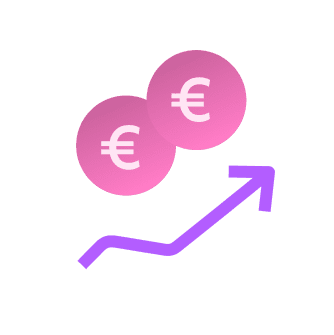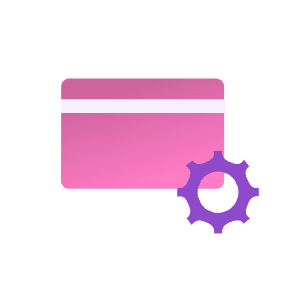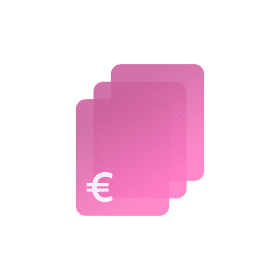Turn outstanding invoices into cash flow with factoring from Factris.
What is factoring?
Factoring is an increasingly popular alternative method of financing for entrepreneurs. But what is factoring and how exactly does it work? Simply put, factoring is the way to receive money at short notice for work carried out for which the invoice sent has not yet been paid. This way, as an entrepreneur, you no longer have to take into account the payment term and have the relevant amount at your disposal within 24 hours. It makes factoring ideal for small businesses and freelancers who need to bridge the gap between when the work is completed and when they get paid for it.
Factoring meaning
The definition of factoring is “the business activity of selling debtors to a financial institution at a discount to obtain cash.” In other words, the moment you invoice invoices, you essentially sell them to a third party (the factor) – in this case, Factris – at a small discount. The factor then pays you the full amount of the invoice, minus their fee, after which the factor assumes the risk of collecting payment from your customer.

How does factoring work?
In most cases, when a company sells products or services on credit, the buying party has 30 days to pay. In the meantime, however, the selling company still has to pay its own suppliers and employees, even if the customer has not yet paid. This can create a cash flow problem for companies in some cases. Factoring solves this problem by allowing the company to advance the amount owed by the customer. Factris thereby buys the invoice, becomes the owner of the invoice, and ensures that the outstanding amount is collected. This ensures that the selling company is no longer dependent on the 30-day payment period, allowing the amount receivable to be reinvested directly in staff, bills, and other business matters.
So how exactly does factoring at Factris work?
When you use Factris factoring, you sell your invoice to us. Fortunately, our software allows you to upload all your invoices in no time. Based on your preference, we will buy all or part of your invoices. This way, you convert outstanding and future receivables into working capital for your business at lightning speed. Because the outstanding invoice is now ours, we take care of the collection and credit insurance. So you are insured against insolvency and non-payment. This costs only a small fee, which we deduct from the value of the invoice.

Types of factoring
In total, three forms of factoring can be distinguished: traditional factoring, American factoring and reverse factoring. But what actually characterizes these different types of factoring, and to what extent do they differ from each other?
American factoring
Americain Factoring is the most common and simple form of factoring. The main difference from traditional factoring is in the number of invoices sold to the factor. Whereas with traditional factoring all invoices are sold, with Americain Factoring you have the choice of which invoices you do and do not sell. The flexibility of this type of factoring makes many companies qualify for Americain Factoring faster than traditional factoring.
Traditional factoring
Traditional factoring is the original form of factoring. In traditional factoring, the factor buys all the company’s debtors for a percentage of their total value. The factor then assumes responsibility for collecting payment from the customer.
Reverse Factoring
Reverse Factoring is a form of factoring used by companies that are owed money by other companies (called “buyers”). In this case, the buyer agrees to pay for its goods or services within a certain time, and the factor pays the firm immediately. The factor then charges the buyer a fee for this service.
Benefits of factoring

Working capital in an instant. Stop waiting for unpaid invoices, grow your business by turning debtors into working capital.

Collection of receivables so you can focus on your business and not on who still owes you money.

Credit insurance for your financial security. It gives peace of mind to know that with factoring, you are fully insured against insolvency and non-payment.

Credit management makes sure your invoices get paid. This leaves your hands free to work on growing your business.

Risk assessment that lets you know what to expect from a transaction, giving you even more peace of mind.

Monitoring buyers so that you can work with your best customers on the road to even greater success.

Personal support from a human and not a bot. Crisp answers and advice from an experienced account manager, at no extra cost.

Finance Automation for Business (“FAB”), our one-stop platform that makes finance quick and easy. Here you upload invoices, track payments, and receive same-day capital.

Flexible products tailored to your business needs. Choose what you need, forget what you don’t.
Factoring for different industries
Factris factoring is not limited to any particular industry. The ease of the factoring process makes this form of financing suitable for almost any industry. Factris therefore facilitates factoring for various industries. Whether you work in cleaning, transport or marketing; with Factris you will enjoy the benefits of factoring at all times. Wondering what kind of companies are already using Factris factoring? Then take a look among the various stories of our customers.
Factoring SMEs
Besides the fact that factoring is suitable for almost any industry, small and medium-sized enterprises in particular can benefit from factoring. This form of financing can help SMEs grow their business by providing them with working capital. Moreover, factoring companies can provide valuable advice and support to SMEs.

Factoring terms and conditions
There are a number of conditions for using Factris factoring.
Are you suitable for factoring? Then you meet the following conditions

You are a B2B company or a freelancer working for corporate clients

Your invoices are free of pledge

Your company makes more than EUR 50,000 turnover annually

Your business has been in existence for more than six months
Factoring costs
Factoring can be a great way to finance your business, but it is important to know the cost of factoring. Our rates are determined based on a number of factors. Depending on these factors, the average factoring fee is up to 3%. The cost of factoring is calculated based on the volume and risk involved for the paying party.
Here, the costs are made up of an initial and additional amount. The initial amount applies for the first agreed period (30 days). The additional amount applies for each day after the initial period.
